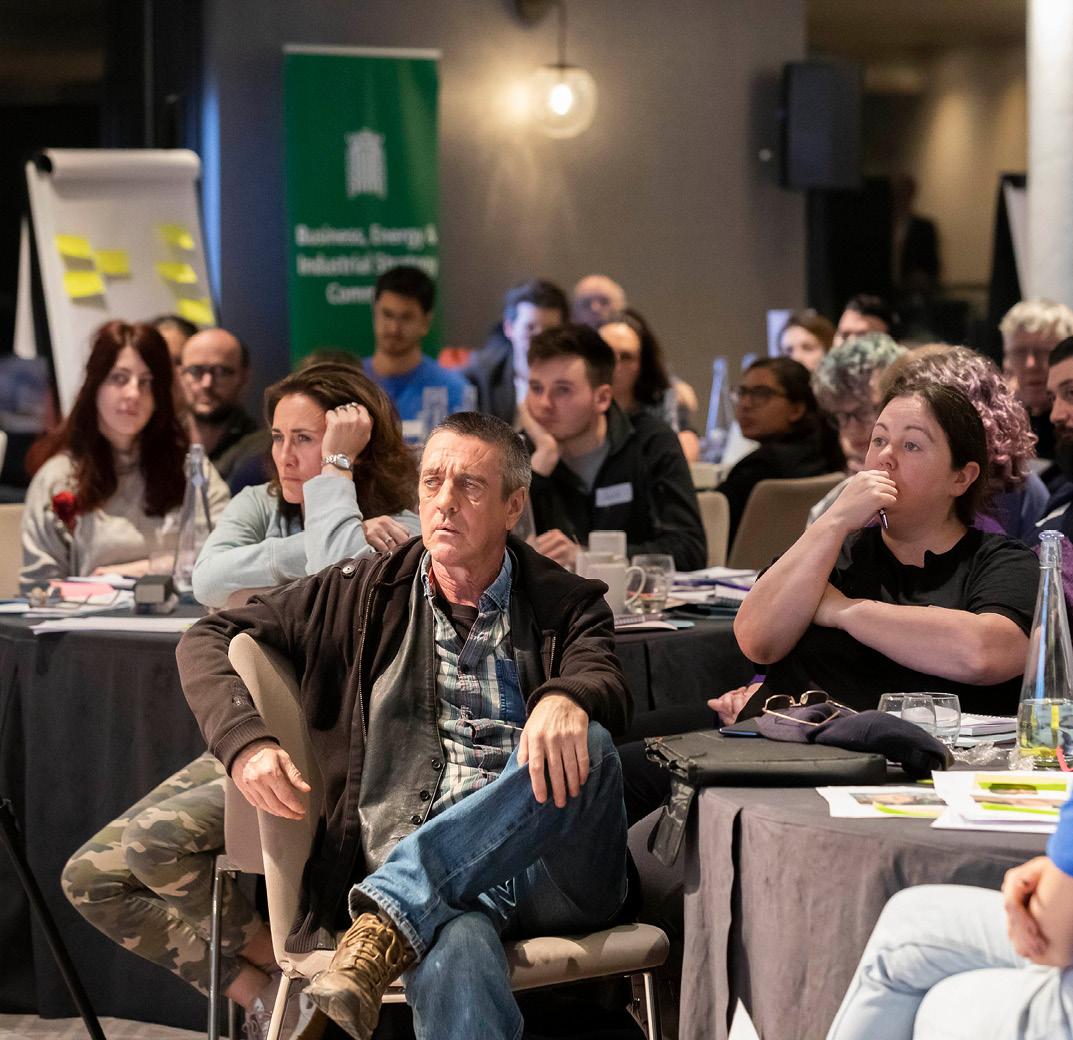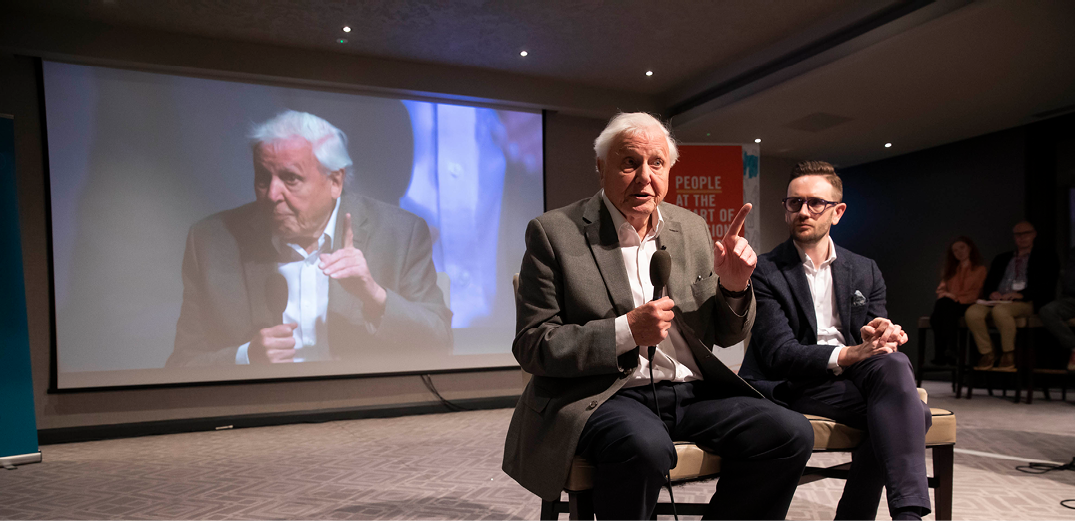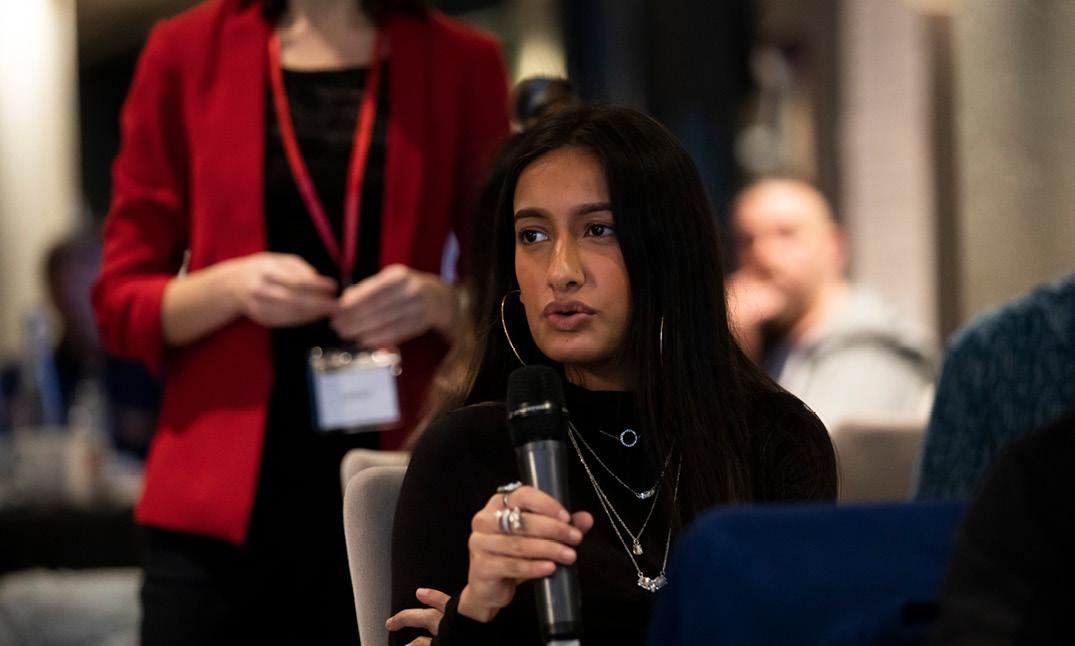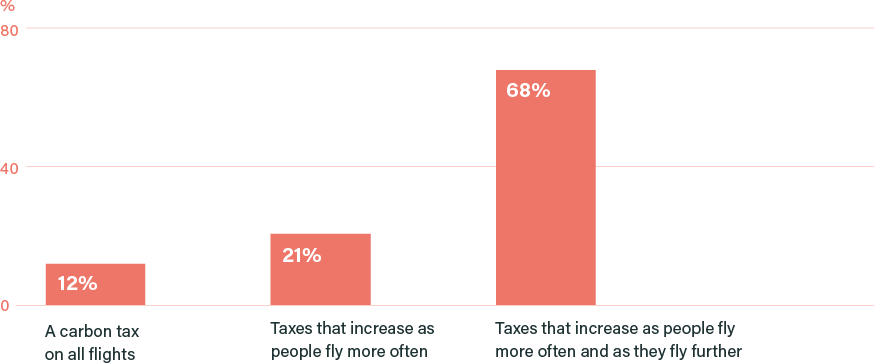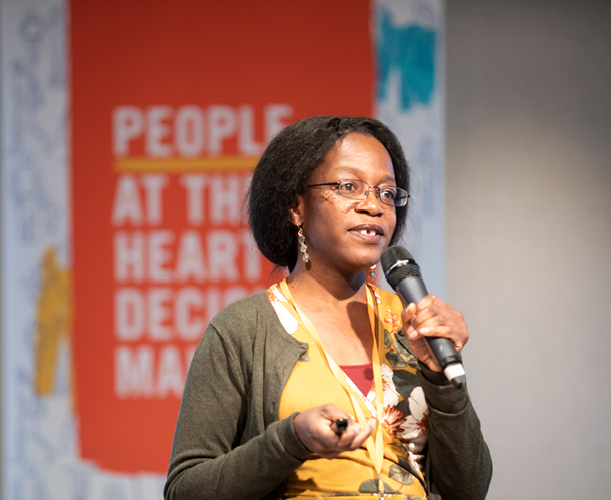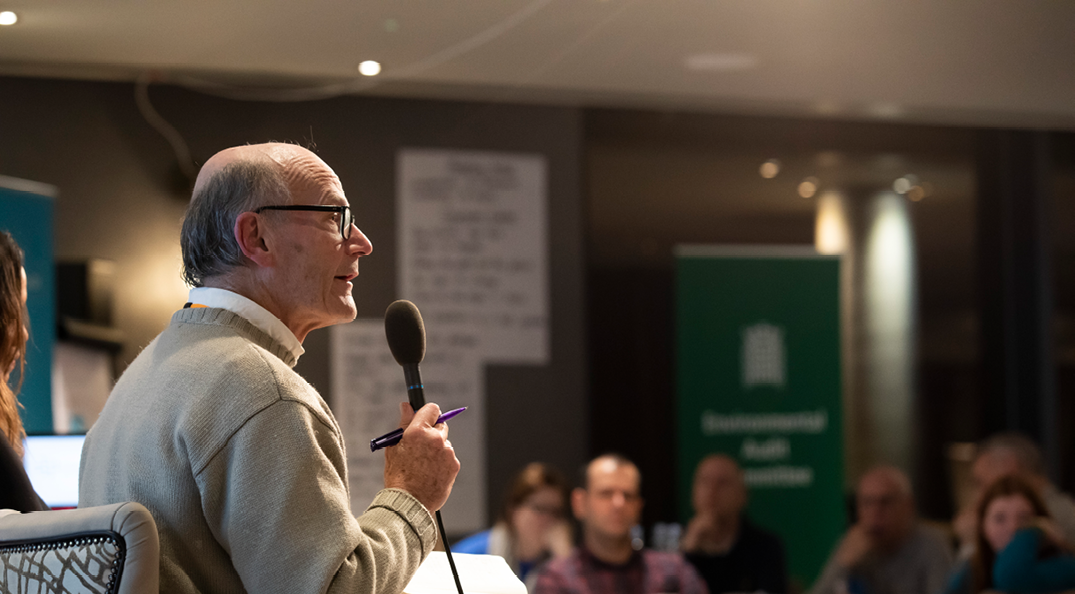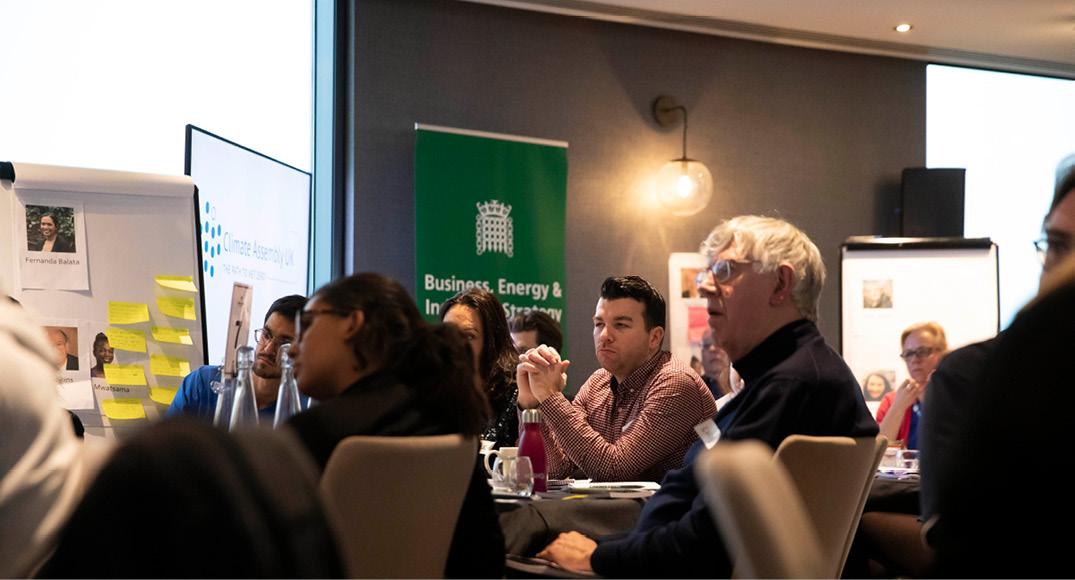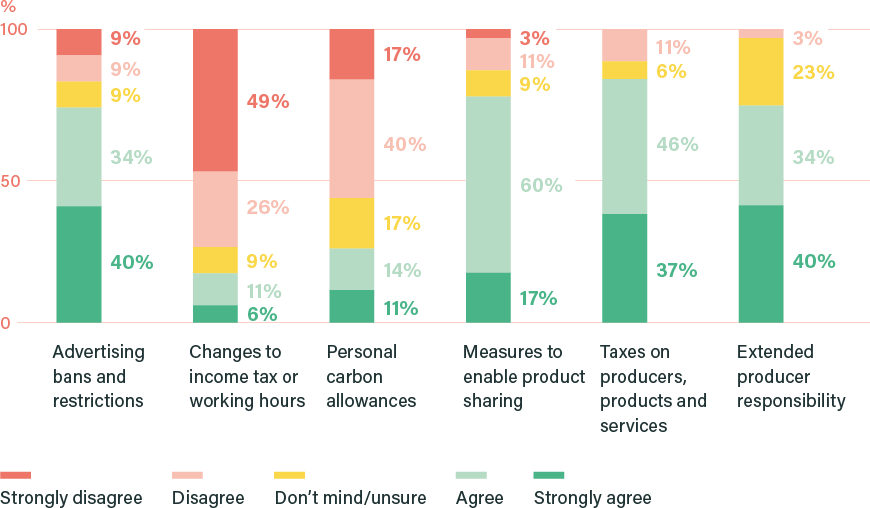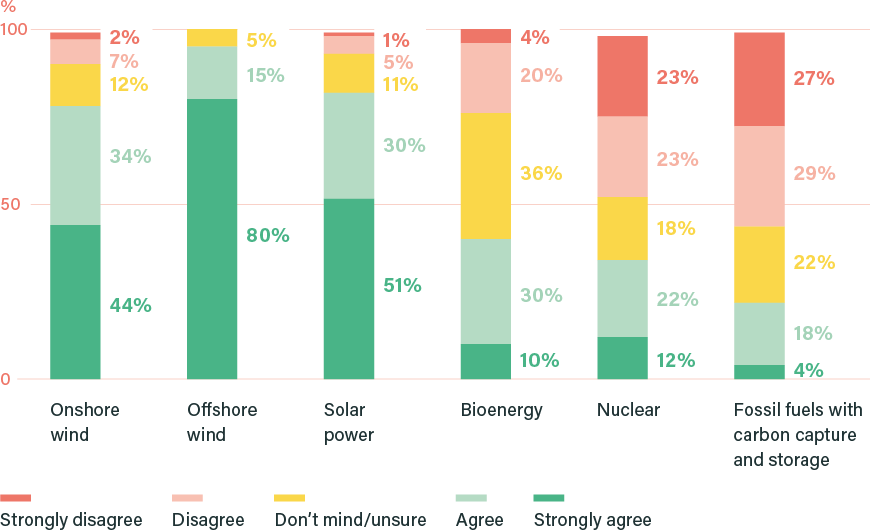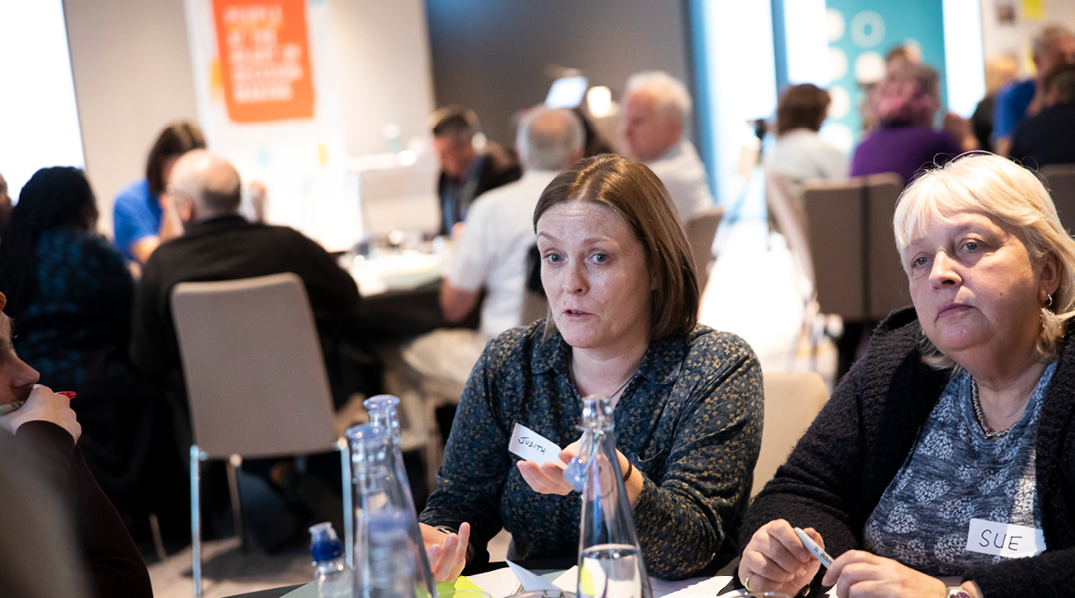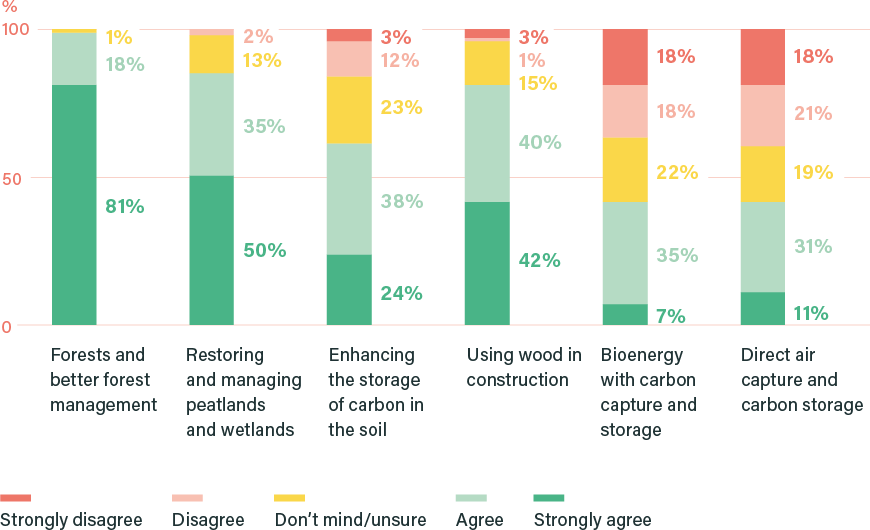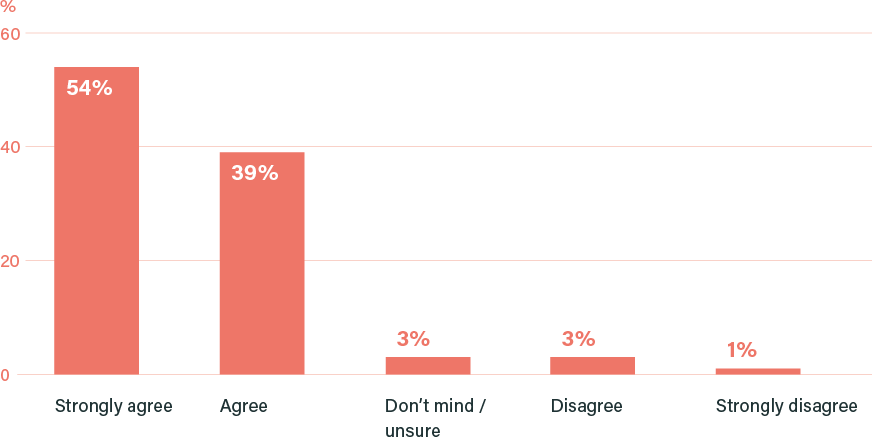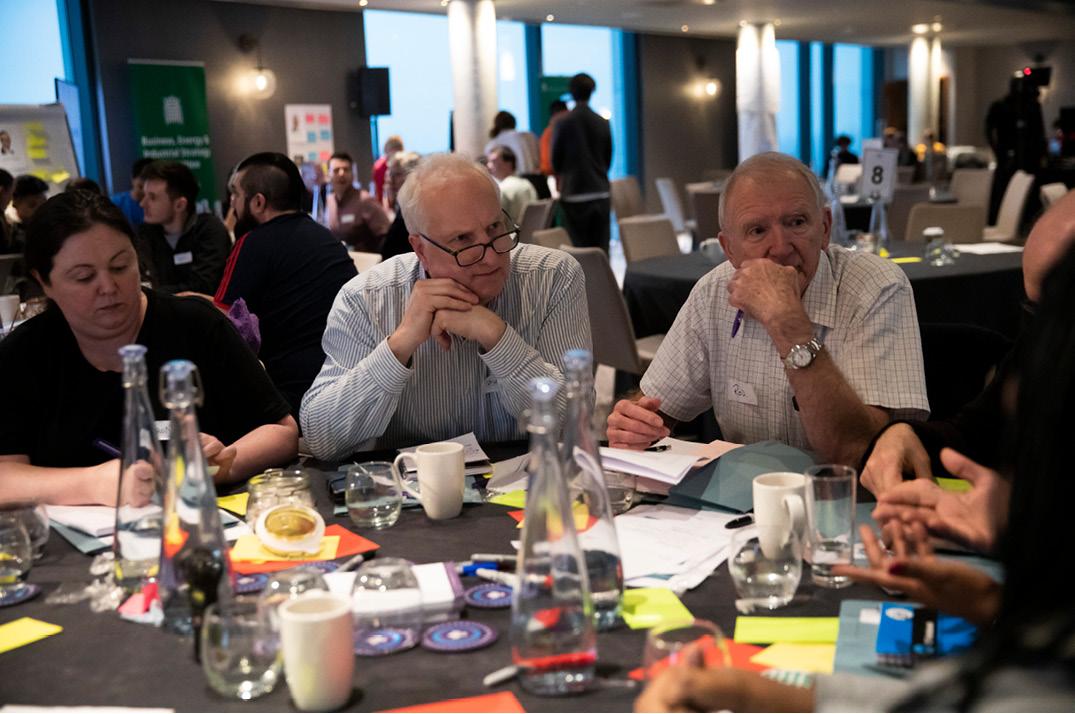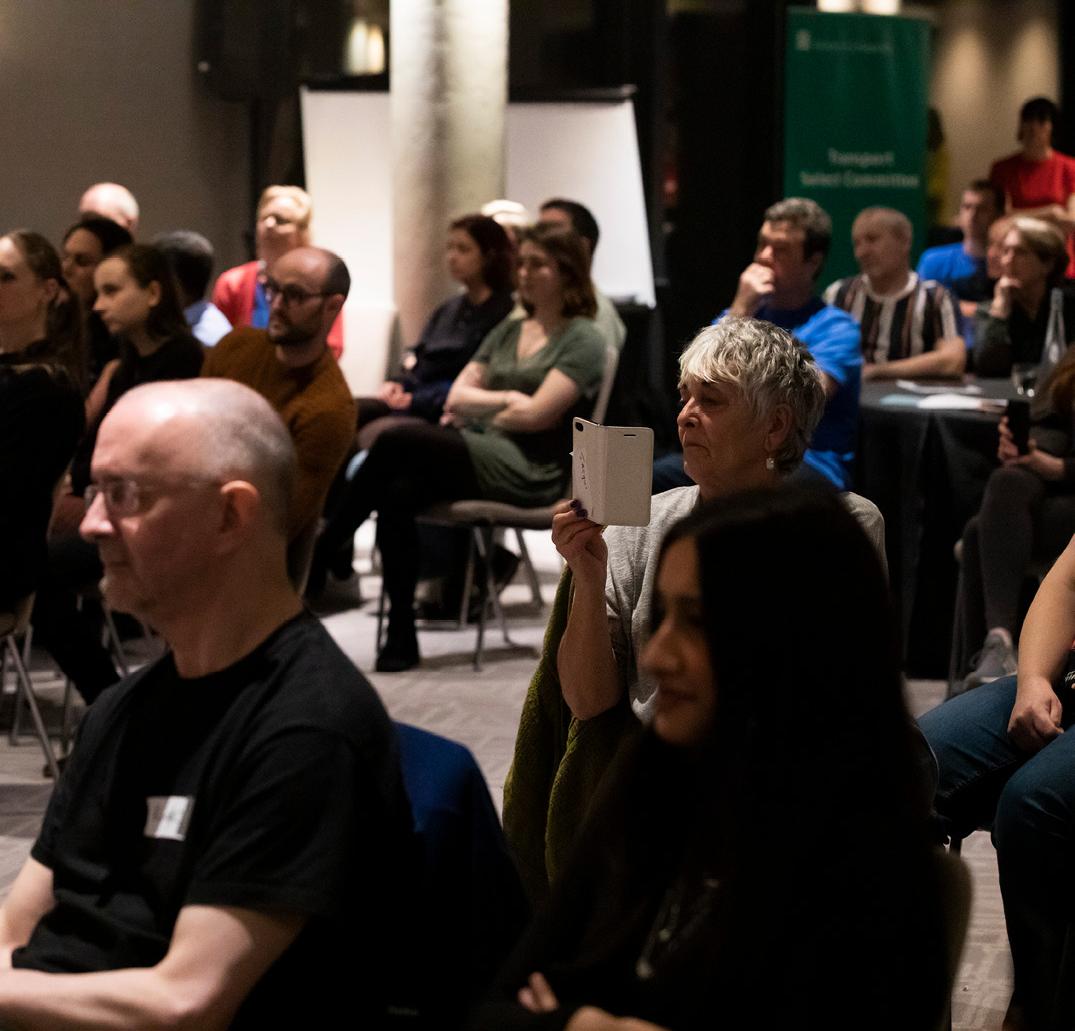Executive summary

We come from all walks of life and all across the UK. We have, between us, many different values, views and experiences. But we have worked together in an atmosphere of respect, co-operation, tolerance and humour to arrive at the considered recommendations in this report.
Our recommendations and the reasons for them are necessarily numerous and detailed. But there are a number of themes that have recurred throughout our discussions that we believe should be at the heart of government's and Parliament's approach to achieving net zero:
Above : Assembly members listen to a speaker.
- Education and information: there is a need for information and education for everyone – individuals, businesses, government and others – about climate change and the steps needed to tackle it. It is essential for buy-in to the changes that are needed.
- Fairness: as with most things in life, the solutions to climate change are neither easy nor free, but they need to be fair. Fair to people with jobs in different sectors. Fair to people with different incomes, travel preferences and housing arrangements. Fair to people who live in different parts of the UK.
- Freedom and choice: we believe it is important to maintain, wherever possible, freedom and choice for both individuals and local areas so that they can choose the solutions that work best for them. This should not be at the expense of taking the steps necessary to ensure a safe and healthy environment for future generations. We have outlined in this report where we believe an acceptable balance lies.
- Co-benefits: tackling climate change could bring with it many advantages. It could see benefits for local communities, high streets and local businesses. It could boost our economy and promote innovation, including in technology. And it could improve our health and reduce pollution. The UK should take advantage of these potential rewards.
- Nature: we need to protect and restore our natural environment, and our access to it. We strongly support measures that have a positive impact on biodiversity and wildlife, whilst also helping the UK move towards its net zero goal.
Some of our strongest views centre on leadership and roles. It is imperative that there is strong and clear leadership from government – leadership to forge a cross-party consensus that allows for certainty, long-term planning and a phased transition. This is not the time nor the issue for scoring party political points. The Covid-19 pandemic that has caused so much suffering brings with it new considerations, but it does not change the need for progress towards the UK's climate goals.
Alongside government leadership, we recognise that achieving net zero will require a joined-up approach across society – all of us will have to play our part. Our recommendations take account of this reality. They seek to provide individuals, communities and organisations with the information, incentives and conditions to make change possible. We hope that our report will be an invaluable resource to government and Parliament as they work to ensure that the UK reaches net zero by 2050.
In June 2019, the UK Government and Parliament agreed that the UK should do more to tackle climate change. They passed a law committing the UK to reaching net zero greenhouse gas emissions by 2050. Decisions about how the target is reached will affect many aspects of people's lives.
Climate Assembly UK was commissioned by six select committees of the House of Commons1 to examine the question:
Notes ():
1: The six commissioning select committees were: Business, Energy and Industrial Strategy; Environmental Audit; Housing, Communities and Local Government; Science and Technology; Transport; and Treasury. The committees announced their plans for the assembly on 20 June 2019.
"How should the UK meet its target of net zero greenhouse gas emissions by 2050?"
The committees aim to use the assembly's results to inform their work in scrunitising government.
The assembly's 108 members come from all walks of life. Together they are representative of the UK population in terms of: age, gender, ethnicity, educational level, where in the UK they live, whether they live in an urban or a rural area, and their level of concern about climate change.2 The Sortition Foundation recruited assembly members using a process known as 'sortition' (please see Chapter 1). Access, inclusion and assembly members' wellbeing were a priority for the Climate Assembly UK team.
Notes ():
2: For full figures comparing assembly members to the UK population, please see Chapter 1.
"I was a bit worried that it would just be the people who were most passionate about the crisis – that you'd get an influx of people so it would be very one-sided and biased. So to come in and find it is a complete representation: I've spoken to people for who it's a complete crisis – to complete denial or don't believe it's a real thing, that end of the spectrum. So to see that representation was quite a surprise and really refreshing for someone like myself."
Assembly member – Chris, 32, from Oxford
Above : Sir David Attenborough addresses Climate Assembly UK.
The assembly met for six weekends between late January and mid-May 2020 – the first three took place face-to-face in Birmingham; the last three online after the arrival of Covid-19 in the UK. At the weekends, assembly members heard balanced, accurate and comprehensive information about how the UK could meet its net zero target.3 They then engaged in detailed discussions about the best way forwards, before reaching their recommendations. The assembly considered ten topics in total:
Notes ():
3: For more information about the assembly's 47 speakers and how they were chosen, including the roles of the assembly's Expert Leads, Advisory Panel and Academic Panel please see Chapter 1.
- Underpinning principles for the path to net zero (Chapter 2);
- How we travel on land (Chapter 3);
- How we travel by air (Chapter 4);
- Heat and energy use in the home (Chapter 5);
- What we eat and how we use the land (Chapter 6);
- What we buy (Chapter 7);
- Where our electricity comes from (Chapter 8);
- Greenhouse gas removals (Chapter 9);
- The changed context created by Covid-19 (Chapter 10).
- Additional recommendations (Chapter 11).
The assembly was open and transparent, whilst protecting assembly members' identities. Speakers' presentations were publicly available via online live-stream as they happened, and can now be found on the Climate Assembly UK website.4 The assembly was open to a wide range of media, stakeholders, officials and politicians so that they could observe its proceedings. The assembly was funded by the House of Commons, with additional funding from two philanthropic organisations: the Esmée Fairbairn Foundation and the European Climate Foundation. The two philanthropic organisations did not have a say in how the assembly was run or what it covered. Delivery of the assembly was led by The Involve Foundation ('Involve'), with the Sortition Foundation and mySociety (please see Chapter 1).
Notes ():
4: The website also contains a wealth of other information about the assembly, including how it was funded and who was involved. See climateassembly.uk
The path to net zero: Climate Assembly UK report recounts the assembly's detailed and considered view of its recommended path to net zero by 2050. Taken together the recommendations provide an internally consistent and coherent vision, and are designed to be considered as a whole.
Assembly members' first decision was on the principles that should underpin the UK's path to net zero. They worked in small groups to discuss and draft the principles, before using a vote to prioritise them.
In total, assembly members agreed twenty-five underpinning principles for the path to net zero.
Votes indicate how many assembly members felt a principle should be a priority, not how many supported it.5
Notes ():
5: Each assembly member could vote for eight principles.
- Informing and educating everyone (the public, industry, individuals and government) – 74 votes
- Fairness within the UK, including for the most vulnerable (affordability, jobs, UK regions, incentives and rewards) in actions, not just words – 65 votes
- Leadership from government that is clear, proactive, accountable and consistent – 63 votes
- Protecting and restoring the natural world – 59 votes
- Ensuring solutions are future-proofed and sustainable for the future – 45 votes
- A joined-up approach across the system and all levels of society (working together, collaborating, sharing) – 40 votes
- Long-term planning and a phased transition – 39 votes
- Urgency – 37 votes
- Support for sustainable growth (including pioneering innovation) – 37 votes
- Local community engagement embedded in national solutions – 33 votes
- Think about our impact globally and be a global leader – 32 votes
- Use of mix of natural and technological solutions – 32 votes
- Transparency and honesty – 32 votes
- Underpinned by scientific evidence and focused on the big wins – 29 votes
- Equality of responsibility for individuals, government and business – 28 votes
- Achievable – 27 votes
- Everyone should have a voice (e.g. via local representation and participation, or in holding government to account) – 27 votes
- Regular independent checks on progress – 27 votes
- Fairness for the most vulnerable globally (less developed countries) – 24 votes
- Making the most of potential benefits for everyone (e.g. health, wellbeing and the economy) – 24 votes
- Enabling and not restricting individual choice – 23 votes
- Protect the UK economy, including from global competition – 18 votes
- Compromise about changing lifestyles – 15 votes
- Those who bear the most responsibility should act – 13 votes
- Not negatively impacting other institutions – 4 votes
Assembly members returned to these principles, and considerations related to them, throughout the assembly.
Above : An assembly member asks a speaker a question.
The ways we travel on land include cars, vans and lorries, as well public transport like buses, coaches and trains. They also include 'active transport', for example walking, cycling and scootering. Together these ways of moving around account for 70% of the UK's total greenhouse gas emissons from transport and 23% of the UK's greenhouse gas emissions overall.6
Notes ():
6: Climate Assembly UK considered our travel on land for personal uses such as shopping, the school run and commuting. The assembly did not look at transport used for services and to move goods, also known as freight. This followed guidance from Parliament about where to focus if there was not time to consider all aspects of land travel.
Assembly members recommended a future which minimises restrictions on travel and lifestyles, placing the emphasis on shifting to electric vehicles and improving public transport, rather than on large reductions in car use. They recommended:
- A ban on the sale of new petrol, diesel and hybrid cars by 2030–2035;
- A reduction in the amount we use cars by an average of 2–5% per decade;
- Improved public transport.
Assembly members identified 18 considerations that they would like government and Parliament to bear in mind when looking at how we travel on land and the path to net zero. A full list can be found in Chapter 3. Assembly members' ten highest priority considerations were:
- Ensure solutions are accessible and affordable to all sections of society;
- Help create significant change at an individual level, including through education, incentives and disincentives;
- Achieve cross-party support for decisions so that they are not changed by successive governments;
- Follow the principle that the polluter should pay ;
- Check and be careful about side effects, including moral, ethical and environmental implications;
- Invest in and develop public transport to make it accessible and affordable;
- Invest more and faster in research and development for technologies ;
- Ask an independent regulator to assess long-term consequences of the science and policies;
- Protect jobs and industry, and support them to transition;
- Free bus travel, as introduced in Dunkirk. 7
Notes ():
7: This refers to a case study presented by one of the speakers, Lynn Sloman, during weekend two of the assembly. It showed the impact of introducing free bus travel in Dunkirk in autumn 2018. Bus trips increased by 85% on some routes, and half of the new bus users previously travelled by car.
In addition, assembly members recommended fifteen policies aimed at moving quickly to low carbon vehicles, increasing public and active transport, or discouraging car ownership and use. Policies supported by at least two-thirds of assembly members were:
On public transport
- Government investment in low carbon buses and trains (91%);8
- Adding new bus routes and more frequent services (86%);
- Making public transport cheaper (83%);
- Bringing public transport back under government control (75%);
- Increasing investment to make buses faster and more reliable (66%).
Notes ():
8: % of assembly members who 'strongly agreed' or 'agreed' that the policy should be part of how the UK gets to net zero.
On the cars we drive
- Quickly stop selling the most polluting vehicles (86%);
- Grants for businesses and people to buy low carbon cars (74%);
- Car scrappage scheme (66%).
On active transport
- Investing in cycling and scootering facilities (70%).
On travelling less
- Localisation (72%).9
Notes ():
9: 'Localisation' was described as involving (1) changing regulations to ensure that new houses can only be built with good public transport links, and (2) including or putting back into local areas services such as post offices, local shops, health centres and schools.
Air travel accounts for 22% of the UK's total greenhouse gas emissions from transport, and 7% of the UK's total greenhouse gas emissions overall. Emissions from flying have grown significantly in the last 30 years.10
Notes ():
10: Climate Assembly UK considered air travel for personal use. The assembly did not look at air travel for the transportation of goods. This followed guidance from Parliament on where to focus, if there was not time to consider both.
Assembly members identified 14 considerations that they would like government and Parliament to bear in mind when looking air travel and the path to net zero. A full list can be found in Chapter 4. Assembly members' ten highest priority considerations were:
- Speed up technological progress;
- Influence the rest of the world;
- Even out the costs of air travel compared to alternatives;
- Frequent fliers and those that fly further should pay more;
- Stay competitive and protect the economy;
- Engage the population in making the necessary changes;
- Take account of different travel needs (e.g. people with family far away);
- Promote and incentivise UK holidays;
- Scrap incentives to make people fly more (e.g. air miles, first class);
- Ban polluting private jets and helicopters, moving to electric when possible.
Assembly members would like to see a solution to air travel emissions that allows people to continue to fly. Assembly members felt that this would protect people's freedom and happiness, as well as having benefits for business and the economy. Assembly members' support for continued flying did, however, have limits. Assembly members resoundingly rejected a future in which air passenger numbers would rise by as much as 65% between 2018 and 2050, labelling it "counterproductive". Instead, assembly members sought to find an acceptable balance between achieving the net zero target, impacts on lifestyles, reliance on new technologies, and investment in alternatives. Assembly members recommended a future in which:
- Growth in air passenger numbers is limited to 25–50% between 2018 and 2050, depending on how quickly technology progresses. This is a lower rate of growth per year than was seen in recent times prior to Covid-19;
- 30m tonnes of CO2 is still emitted by the aviation sector in 2050 and requires removing from the atmosphere;
- There is investment in alternatives to air travel.
80% of assembly members 'strongly agreed' or 'agreed' that taxes that increase as people fly more often and as they fly further should be part of how the UK gets to get zero (see Figure 1). Assembly members saw these taxes as fairer than alternative policy options. They also suggested a number of points around their implementation for policy-makers to bear in mind. Assembly members would like to see the airline industry invest in greenhouse gas removals. 75% of assembly members 'strongly agreed' or 'agreed' that this should be part of how the UK gets to net zero. There was also significant support for financial incentives from government to encourage a wide range of organisations to invest. Assembly members tended to feel that 'the polluter should pay', although some suggested a need to monitor, scrutinise and perhaps enforce airline industry investment to ensure it actually takes place. Assembly members strongly supported the need to invest in the development and use of new technologies for air travel. 87% of assembly members 'strongly agreed' or 'agreed' that this should be part of how the UK gets to net zero. These technologies could include electric aircraft and synthetic fuels.
A carbon tax on all fights 12%
Taxes that increase as people fly more often 21%
Taxes that increase as people fly more often 21%
Taxes that increase as people fly more often and as they fly further 68%
Figure 1: Please rank the following policy options in order of preference (% 1st preference votes)
Around 15% of the UK's greenhouse gas emissions come from the residential sector. Reducing these emissions means changes to the use of heating, hot water and electricity in the home.11
Notes ():
11: https://assets.publishing.service.gov.uk/government/uploads/system/uploads/attachment_data/file/862887/2018_Final_greenhouse_gas_emissions_statistical_release.pdf
Assembly members' recommendations on heat and energy use in the home show a strong push for action. They also consistently emphasised their support for:
- Tailored solutions, enabling local authorities and other local organisations to chose solutions suited to their local areas, and householders to pick the options best for them;
- Increased choice, including through steps to increase competition;
- Reliable and clear information for the public;
- A need for solutions to work for all income groups and housing types .
Some assembly members noted concerns about the influence and behaviour of big companies and around the use of personal data.
On home retrofits, assembly members emphasised the need to minimise disruption in the home, put in place support around costs, and offer flexibility and choice to homeowners. They had a slight preference for upgrading each home all in one go (56%), compared to upgrading each home gradually (44%) but attached conditions to the former around how it is financed. Some assembly members stressed that the choice between gradual and all-in-one retrofits should be one for homeowners.The best technology to use for zero carbon heating is a matter of significant policy debate. However at least 80% of assembly members 'strongly agreed' or 'agreed' that each of hydrogen (83%), heat pumps (80%), and heat networks (80%) should be part of how the UK gets to net zero.94% of assembly members 'strongly agreed' or 'agreed' that "people in different parts of the country should be offered different solutions to zero carbon heating" (see Figure 2). They argued that areas should be able to choose the technologies best suited to their needs.
Assembly members emphasised the need for a long-term strategy with a wide range of actors taking steps to move the sector towards net zero. Assembly members strongly supported roles for government investment (80%), local solutions (80%), individual responsibility (80%) and market innovation (80%).
Figure 2: "People in different parts of the country should be offered different solutions to zero carbon heating" (%)
Assembly members also backed a wide range of specific measures to create change. A majority of assembly members 'strongly agreed' or 'agreed' that 19 policy measures should be part of how the UK gets to net zero. Policies supported by at least two-thirds of assembly members were:
- Support for smaller organisations to offer energy services (94%);
- Simpler consumer protection measures (92%);
- Changes to product standards to make products more energy efficient and 'smart' (91%);
- Local plans for zero carbon homes (89%);
- A ban on sales of new gas boilers from 2030 or 2035 (86%);
- Changes to energy market rules to allow more companies to compete (86%);
- Changes to VAT on energy efficiency and zero carbon heating products (83%);
- Information and support funded by government (83%), or information and support provided by government (72%);
- Government help for everyone (69%), or government help for poorer households (68%);
- Enforcing district heating networks (66%).
Assembly members looked at food, farming and land use together because of the impact they have on one another. In total, about a tenth of the UK's greenhouse gas emissions currently come from farming and ways we use the land.
Above : One of the speakers, Dr Modi Mwatsama from Wellcome, presents to the assembly.
Assembly members put forward eight considerations for government and Parliament to bear in mind when making decisions about food, farming, land use and the path to net zero. These focussed on (for the full, detailed wording please see Chapter 6):
- Providing support to farmers;
- Information and education;
- Using land efficiently;
- Rules for large retailers and supermarkets;
- More local and seasonal food;
- Making low carbon food more affordable;
- Some, just less, meat;
- Considering net zero as part of planning policy and new developments, including support for allotments.
Assembly members recommended a future for food, farming and land use in the UK centred around:
- Local produce and local food production – assembly members noted potential community benefits, fairer prices for farmers, a 'feel good factor' and reduced environmental impacts;
- A change in diet to reduce meat and dairy consumption by between 20% and 40% – the assembly stressed the significance of education, saying these changes should be voluntary rather than compulsory;
- A "managed diversity" of land use , including steps such as restoring woodlands, peatlands and gorselands.
Assembly members highlighted the need for the above to be combined with measures to support farmers to make the transition, and ensure changes do not disproportionately affect the less well off. Assembly members said changes should not compromise animal welfare, and expressed strong concerns about GM and lab grown food. They asked for policy-makers to take into account the implications for smaller farms, the suitability of different land for different uses, and differences in impact between UK regions .
Assembly members recommended policies to change both farming, food production and land use, and retail and individuals' behaviour. At least two-thirds 'agreed' or 'strongly agreed' that nine policies should be part of how the UK gets to net zero. These were:
- Labelling food and drink products to show the amount of emissions that come from different foods (94%);
- Information and skills training for people who manage the land in order to encourage low carbon farming practices and reduce emissions (91%);
- Low carbon farming regulations, for example, making farm payments conditional on low carbon practices and other public benefits, like protecting biodiversity (89%);
- Paying farmers and other landowners to use their land to absorb and store carbon, for example by restoring peatland or planting trees (87%);
- Amending the procedure for awarding government contracts to give preference to low carbon food producers (77%) and carbon storing products such as those from forestry (84%);
- Changing planning rules so that food can be produced sustainably in a wider range of areas (83%);
- Taxes and incentives for reducing food waste, for example to encourage shops to reduce waste; penalise food waste by businesses and individuals; and encourage supermarkets, restaurants and shops to serve smaller portion sizes (72%);
- Taxes and incentives for low carbon foods (66%).
Full details of assembly members' views on these policies can be found in Chapter 6.
Above : One of the speakers, Professor Paul Ekins from University College London, takes questions from assembly members.
The things we buy are linked to climate change because they use energy, and some of that energy comes from fossil fuels like oil, coal and gas.
Products use energy while they are being made, through services we use when we buy them and because of how they reach us. Some products also need energy to run. When we then throw products away that has implications for climate change too. The UK has traditionally sent most of its waste to landfill sites. Some of this waste generates potent greenhouse gases as it rots.
Assembly members' recommendations on 'what we buy' entail changes for businesses in particular, but also for individuals. Assembly members identified five areas as key:
- Assembly members strongly supported a future in which businesses make products using less – and lower carbon – energy and materials. They backed a range of specific policies to support this aim, including 'resource efficiency targets and standards' (91%), an 'amended procedure for awarding government contracts that gives preference to low carbon companies and products' (83%), taxes on producers, products and services (83%), and 'extended producer responsibility' (79%).
- Assembly members supported the idea of individuals repairing and sharing more, with less purchasing of new products. They backed 'measures to enable product sharing' (77%) including technical and financial support to businesses who offer sharing or renting services.
- Assembly members felt strongly about the need for better information to promote informed choice and changes in individual behaviour. They supported 'labelling and information about the carbon emissions caused by different products and services' (92%) and 'product labelling and information campaigns about what can be recycled and why it's important' (92%). They also backed 'advertising bans and restrictions' on high emissions products or sectors (74%).
- Assembly members supported a range of measures aimed at increasing recycling, including 'deposit return schemes' (86%), 'increased doorstep recycling' (85%), and 'grants and incentives for businesses' to improve recycling, develop new materials and make goods from recycled materials (77%).
- Assembly members called for long-term commitment from government and Parliament. They emphasised the importance of cross-party support to prevent policies changing when governments change, as well as the need to look at both quick wins and long-term solutions.
Above : Assembly members listen to a speaker.
In addition to these five areas, some assembly members raised points for government and Parliament to consider around imports, ring-fencing any tax revenue generated by the above policies, and protecting consumers from increased costs. Some also highlighted trust and compliance issues relating to business, asking for transparency, honesty, strong enforcement, and reliable and independent information and schemes.
Assembly members did not support policies around changing income tax or working hours, personal carbon allowances, voluntary agreements, recycling requirements and pay-as-you-throw schemes.
Advertising bans and restrictions
40% Strongly Agree
34% Agree
9% Don’t mind or unsure
9% Disagree
9% Strongly disagree
Changes to income tax or working hours
6% Strongly Agree
11% Agree
9% Don’t mind or unsure
26% Disagree
49% Strongly disagree
Personal carbon allowances
11% Strongly Agree
14% Agree
17% Don’t mind or unsure
40% Disagree
17% Strongly disagree
Measures to enable product sharing
17% Strongly Agree
60% Agree
9% Don’t mind or unsure
11% Disagree
3% Strongly disagree
Taxes on producers, products and services
37% Strongly Agree
46% Agree
6% Don’t mind or unsure
11% Disagree
Extended producer responsibility
40% Strongly Agree
34% Agree
25% Don’t mind or unsure
3% Disagree
Figure 3: How much do you agree or disagree that each of the following policy options should be part of how the UK gets to net zero?(%)
How the UK generates its electricity is a central question on the path to net zero. The UK still produces a significant amount of its electricity from fossil fuels, particularly gas. This emits carbon dioxide, which contributes to global warming and climate change.
All the UK's electricity generation will need to come from low carbon sources if it is to meet its net zero target. The UK is also likely to need more electricity in future due to an increase in electric vehicles and electric heating.
Large majorities of assembly members 'strongly agreed' or 'agreed' that three ways of generating electricity should be part of how the UK gets to net zero :
- Offshore wind (95%);
- Solar power (81%);
- Onshore wind (78%).
Assembly members tended to see these technologies as proven, clean and low cost, with wind-based options suitable for a "windy" UK. Offshore wind had key additional benefits, particularly being "out of the way". Solar power was viewed as flexible in terms of where it can be located, among other advantages.
Some assembly members suggested a range of points to bear in mind when implementing all three technologies. These included their location and environmental impact, progress on electricity storage, ways to incentivise and facilitate uptake, visual design, and where they are manufactured.
Assembly members were much less supportive of bioenergy, nuclear and fossil fuels with carbon capture and storage – although, particularly for bioenergy, significant numbers of assembly members were unsure about its use:
- 40% of assembly members 'strongly agreed' or 'agreed' that bioenergy should be part of how the UK gets to net zero, 36% were 'unsure', and 24% 'strongly disagreed' or 'disagreed';
- The equivalent figures for nuclear were 34%, 18% and 46%;
- For fossil fuels with carbon capture and storage the results were 22%, 22% and 56%. 12
Notes ():
12: 105 assembly members were selected to be strictly representative of the UK population. The final five assembly members were used to over-sample groups that are either very small (meaning that an assembly member being ill for a weekend, for example, would leave them poorly represented) or which are more likely to drop out of the assembly process. For example, we slightly over-sampled people from Northern Ireland. Similarly, taken together, people in the attitudes to climate change poll who are 'not at all' or 'not very concerned' about climate change are slightly over-represented (+3 people) amongst assembly members.
For some assembly members, their view on bioenergy would depend on how bioenergy is produced, including what is being burnt, how production is regulated, and therefore what its environmental and CO2 impacts are. Assembly members' concerns about bioenergy included burning trees and crops, land use, environmental effects, and a feeling that better alternatives exist.
Above : A question and answer session is live-streamed online.
Assembly members saw three main disadvantages to nuclear : its cost, safety, and issues around waste storage and decommissioning.
Their concerns about fossil fuels with carbon capture and storage centred on safety risks (if carbon leaked during storage or transfer), the continued use of fossil fuels, and a feeling that it only provides a "short-term", expensive solution when better alternatives are available.
Assembly members did not hear detailed evidence about tidal, wave, hydro and geothermal technologies. However, assembly members were in principle supportive of the use of these final four ways of generating electricity, particularly for suitable local areas.
Onshore wind
44% Strongly Agree
34% Agree
12% Don’t mind or unsure
7% Disagree
2% Strongly disagree
Offshore wind
80% Strongly Agree
15% Agree
5% Don’t mind or unsure
0% Disagree
0% Strongly disagree
Solar power
51% Strongly Agree
30% Agree
11% Don’t mind or unsure
5% Disagree
1% Strongly disagree
Bioenergy
10% Strongly Agree
30% Agree
36% Don’t mind or unsure
20% Disagree
4% Strongly disagree
Nuclear
12% Strongly Agree
22% Agree
18% Don’t mind or unsure
23% Disagree
23% Strongly disagree
Fossil fuels with carbon capture and storage
4% Strongly Agree
18% Agree
22% Don’t mind or unsure
29% Disagree
27% Strongly disagree
Figure 4: How much do you agree or disagree that each of the following technologies should be part of how the UK generates electricity? (%)13
Notes ():
13: Where bars in the graph don't add up to 100% this is because some assembly members abstained.
Achieving the UK's climate change target requires reducing greenhouse gas emissions as much as possible. However reducing emissions alone will not be enough.
Above : Assembly members discuss the issues.
By the middle of this century some emissions will still remain. For the themes considered by Climate Assembly UK, this is particularly true of air travel and farming. The assembly's recommendations in these areas suggest remaining emissions by 2050 of between 45–55 million tonnes per year. The assembly therefore considered how best to remove these remaining emissions from the atmosphere.
Assembly members suggested that a combination of greenhouse gas removal methods will be needed to achieve the UK's net zero target.
Assembly members recommended that four greenhouse gas removal methods should be part of how the UK gets to net zero:
- Forests and better forest management (99%);14
- Restoring and managing peatlands and wetlands (85%);
- Using wood in construction (82%);
- Enhancing the storage of carbon in the soil (62%).
Notes ():
14: % assembly members who 'strongly agreed' or 'agreed' that this greenhouse gas removal method should be part of how the UK gets to net zero.
Assembly members saw these methods as the most "natural" and as having significant co-benefits, including around preventing flooding and erosion, promoting biodiversity, access to nature and enjoyment. Assembly members also set out a number of conditions around their implementation, including that it is planned and managed well (for example, planting the right trees in the right places), support for farmers, sustainability, and the balance of land use.
Assembly members were less supportive of Bioenergy with Carbon Capture and Storage (BECCS) and Direct Air Carbon Capture and Storage (DACCS). Only 42% of assembly members 'strongly agreed' or 'agreed' that each of these methods should be part of how the UK gets to net zero, while 36% (BECCS) and 39% (DACCS) 'strongly disagreed' or 'disagreed'.
Common concerns about BECCS and DACCS included the potential for leaks from carbon storage sites and a feeling that they failed to address the problem, including a risk that they are "treated as [a] magic solution" that "takes the focus off the amount that we are emitting in the first place." Assembly members also saw these methods, particularly DACCS, as being less natural, costly and unproven in terms of the technology they require.
Whilst BECCS and DACCS received limited support, some assembly members are keen that further research and development takes place. Some noted that these technologies could perhaps then be used more in the future or that they might be needed to "mop up" remaining CO2.
Forests and better forest management
81 % Strongly Agree
18 % Agree
1 % Don’t mind or unsure
Restoring and managing peatlands and wetlands
50% Strongly Agree
35% Agree
13% Don’t mind or unsure
2% Disagree
Enhancing the storage of carbon in the soil
24% Strongly Agree
38% Agree
23% Don’t mind or unsure
12% Disagree
3% Strongly disagree
Using wood in construction
42% Strongly Agree
40% Agree
15% Don’t mind or unsure
1% Disagree
3% Strongly disagree
Bioenergy with carbon capture and storage
7% Strongly Agree
35% Agree
22% Don’t mind or unsure
18% Disagree
18% Strongly disagree
Direct air capture
11% Strongly Agree
31% Agree
19% Don’t mind or unsure
21% Disagree
18% Strongly disagree
Figure 5: How much do you agree or disagree that each of the following greenhouse gas removal methods should be part of how the UK gets to net zero? (% votes)
The arrival of Covid-19 in the UK saw an additional item added to the assembly's agenda. At the request of both Parliament and assembly members themselves, space was made for consideration of the changed context for reaching net zero created by the pandemic, lockdown and their economic impacts.15
Notes ():
15: The resulting session took place at the final assembly weekend on 16th May. At the time, strict lockdown measures were in place in all four UK nations.
Assembly members' views on this topic are significant. There is no other group that is at once representative of the UK population, and well-acquainted with the sorts of measures required to reach net zero.
A large majority of assembly members (79%) 'strongly agreed' or 'agreed' that, 'steps taken by the government to help the economy recover should be designed to help achieve net zero'. When giving their rationale, they most frequently recommended that the government:
- Limit, or put conditions on, investment in high carbon industries;
- Rethink and invest in infrastructure;
- Support low carbon industries;
- Make the most of the economic opportunities presented by the path to net zero;
- Deal with Covid-19 and climate change together where possible;
- Take advantage of the current opportunities for change.
Assembly members who were unsure or who disagreed with the statement tended to emphasise a need to focus on economic recovery first and foremost.
Another large majority of assembly members (93%) 'strongly agreed' or 'agreed' that, 'as lockdown eases, government, employers and/or others should take steps to encourage lifestyles to change to be more compatible with reaching net zero'. Assembly members expressed support for encouraging homeworking and changes to how we travel, and again noted that this "tough and sad time" presents an opportunity for change. They also saw a key role for government in providing leadership and information, alongside roles for business and local areas.
Figure 6: "As lockdown eases, government, employers and/or others should take steps to encourage lifestyles to change to be more compatible with reaching net zero" (%)
Assembly members tended to avoid expressing 'strong' 16 views about whether Covid-19 and the lockdown had made them think or feel differently about how the UK should get to net zero. In general their comments reflected the changed context created by Covid-19 rather than requests for alterations to specific recommendations.
Notes ():
16: They tended to choose 'agree' or 'disagree' in all four relevant votes, rather than 'strongly agree' or 'strongly disagree'.
Overall assembly members tended to agree that their thoughts and feelings about the path to net zero in general had changed (62%). They talked about a new sense of opportunity for change, and altered perceptions of what is possible (e.g. what government can do). They also noted lifestyle changes that are already happening. Some highlighted the economic impacts of the pandemic, suggesting, for example, that they make reaching net zero more difficult.73% of the assembly members who had looked at 'how we travel' during assembly weekends two and three said that Covid-19 and lockdown had changed their thoughts and feelings about how to get to net zero in this area. They noted:
- The changes happening to air travel, with some assembly members suggesting that people may continue to fly less;
- Homeworking becoming more acceptable;
- The impact on public transport, with people currently less willing to use it and questions about whether or not that will last long-term;
- Increases in cycling and walking, although some questioned whether these would hold during the winter.
Only a minority of assembly members said that their thoughts and feelings had changed about the other assembly themes discussed prior to lockdown: 'in the home' (35%), 'what we eat and how we use the land' (36%), and 'what we buy' (36%).
On the final assembly weekend, all assembly members discussed what further recommendations they wanted to make to Parliament and government. Assembly members worked together to draft suggested additions, which could be on any aspect of the path to net zero. The suggestions were then put to a vote of the whole assembly.
Above : Assembly members discuss the issues.
Assembly members did not hear any new evidence to inform their votes. Their decisions were based on their own experiences, values, views and knowledge, and the information they had heard throughout the assembly. They had the option to abstain or choose 'unsure'.
In total, assembly members voted in favour of thirty-nine additional recommendations. They did not pass two further proposals.
The recommendations touch on themes including: transparency, accountability and decision-making; education, communication and engagement; international action and impacts; and incentives, payments, conditions, and taxes.
For the full list and wording of each recommendation – some are detailed – please see Chapter 11. The ten recommendations that received most support were:
- The transition to net zero should be a cross-political party issue, and not a partisan one (96% support 17);
- More transparency in the relationship between big energy companies and government (94% support);
- Get to net zero without pushing our emissions to elsewhere in the world (92% support);
- Incentives to accelerate progress to net zero and conditions attached for organisations seeking government financial support (91% support);
- A robust media strategy on the outcomes of the Assembly (90% support);
- An independent neutral body that that monitors and ensures progress to net zero, including citizens assemblies and independent experts (89% support);
- Move away from fossil fuels and transition to new energy sources (89% support);
- Products and services labelled to include their carbon footprint (89% support);
- A follow up on the outcomes of the Assembly covering what has been taken into account, what hasn't and why (88% support);
- Harness the response to Covid-19 and COP26 to drive international coordinated action on climate change (87% support).
Notes ():
17: % of assembly members who 'strongly agreed' or 'agreed' with the recommendation.
The assembly did not pass two proposals. Both focussed on reaching net zero by an earlier date than 2050. Slightly more assembly members opposed such a move than supported it, with the balance held by those who were 'unsure' or 'didn't mind.'
Above : Assembly members listen to a speaker.
An independent evaluation of Climate Assembly UK will be published in Spring 2021. However, initial results suggest that assembly members viewed the assembly positively.
| Statement about the assembly, from the survey completed by assembly members after all six weekends | % assembly members ‘strongly agreed’ or ‘agreed’ | % assembly members ‘don’t know / unsure’ | % assembly members ‘strongly disagreed’ or ‘disagreed’ |
|---|---|---|---|
‘I have understood almost everything that the other members of my small group said during our discussions’ | 98 | 1 | 1 |
‘I have understood almost everything that was presented by the speakers’ | 95 | 4 | 1 |
‘I have had enough information to participate effectively’ | 91 | 5 | 4 |
‘The information I have received has been fair and balanced between different view points’ | 78 | 16 | 6 |
‘The assembly has helped me clarify my views about how to reach net zero’ | 96 | 1 | 3 |
‘I have learned a lot during the assembly about how UK can achieve net zero by 2050’ | 95 | 3 | 2 |
‘My fellow participants have respected what I had to say, even when they didn’t agree with me’ | 94 | 5 | 0 |
‘I have had ample opportunity in the small group discussions to express my views’ | 95 | 2 | 3 |
The initial results also:
- Show that 90% of assembly members 'strongly agree' or 'agree' that 'assemblies like this should be used more often to inform government and parliament decision making' .
- Suggest that taking part in the assembly has impacted positively on assembly members' appetite and confidence to engage in political decision-making. 88% of assembly members 'strongly agreed' or 'agreed' that 'I feel more confident to engage in political decision making as a result of being involved in this citizens' assembly'. The same percentage 'strongly agreed' or 'agreed' that 'taking part in this citizens' assembly has made me want to be more involved in other aspects of decision making'.
"Like everyone else, I really enjoyed the entire experience, and I am sorry that it has now come to an end. It was a once in a lifetime opportunity, and I am truly grateful to have been given the chance to take part."
Assembly member
Next section: About Climate Assembly UK
(Contents)
Footnotes
1 The six commissioning select committees were: Business, Energy and Industrial Strategy; Environmental Audit; Housing, Communities and Local Government; Science and Technology; Transport; and Treasury. The committees announced their plans for the assembly on 20 June 2019.
2 For full figures comparing assembly members to the UK population, please see Chapter 1.
3 For more information about the assembly's 47 speakers and how they were chosen, including the roles of the assembly's Expert Leads, Advisory Panel and Academic Panel please see Chapter 1.
4 The website also contains a wealth of other information about the assembly, including how it was funded and who was involved. See climateassembly.uk
5 Each assembly member could vote for eight principles.
6 Climate Assembly UK considered our travel on land for personal uses such as shopping, the school run and commuting. The assembly did not look at transport used for services and to move goods, also known as freight. This followed guidance from Parliament about where to focus if there was not time to consider all aspects of land travel.
7 This refers to a case study presented by one of the speakers, Lynn Sloman, during weekend two of the assembly. It showed the impact of introducing free bus travel in Dunkirk in autumn 2018. Bus trips increased by 85% on some routes, and half of the new bus users previously travelled by car.
8 % of assembly members who 'strongly agreed' or 'agreed' that the policy should be part of how the UK gets to net zero.
9 'Localisation' was described as involving (1) changing regulations to ensure that new houses can only be built with good public transport links, and (2) including or putting back into local areas services such as post offices, local shops, health centres and schools.
10 Climate Assembly UK considered air travel for personal use. The assembly did not look at air travel for the transportation of goods. This followed guidance from Parliament on where to focus, if there was not time to consider both.
11 https://assets.publishing.service.gov.uk/government/uploads/system/uploads/attachment_data/file/862887/2018_Final_greenhouse_gas_emissions_statistical_release.pdf
12 105 assembly members were selected to be strictly representative of the UK population. The final five assembly members were used to over-sample groups that are either very small (meaning that an assembly member being ill for a weekend, for example, would leave them poorly represented) or which are more likely to drop out of the assembly process. For example, we slightly over-sampled people from Northern Ireland. Similarly, taken together, people in the attitudes to climate change poll who are 'not at all' or 'not very concerned' about climate change are slightly over-represented (+3 people) amongst assembly members.
13 Where bars in the graph don't add up to 100% this is because some assembly members abstained.
14 % assembly members who 'strongly agreed' or 'agreed' that this greenhouse gas removal method should be part of how the UK gets to net zero.
15 The resulting session took place at the final assembly weekend on 16th May. At the time, strict lockdown measures were in place in all four UK nations.
16 They tended to choose 'agree' or 'disagree' in all four relevant votes, rather than 'strongly agree' or 'strongly disagree'.
17 % of assembly members who 'strongly agreed' or 'agreed' with the recommendation.
